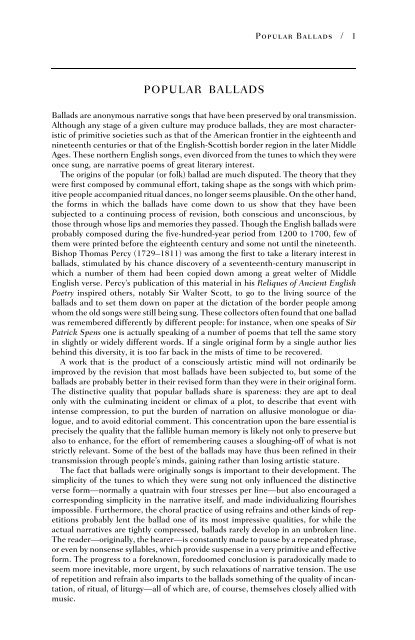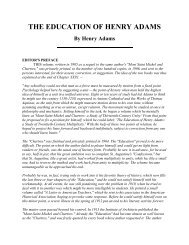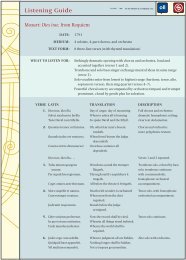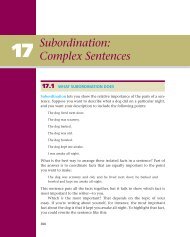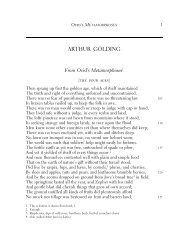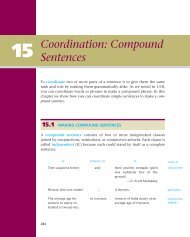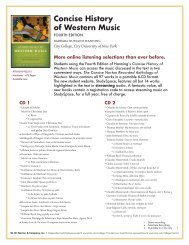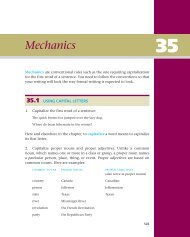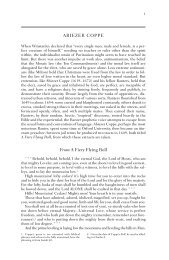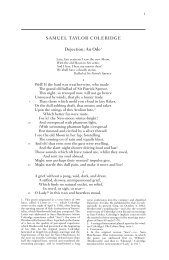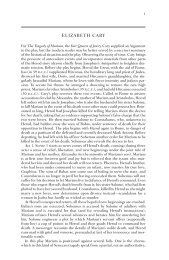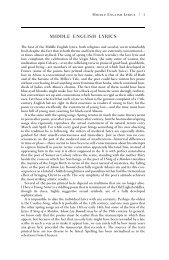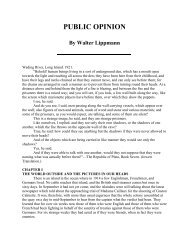POPULAR BALLADS - WW Norton & Company
POPULAR BALLADS - WW Norton & Company
POPULAR BALLADS - WW Norton & Company
Create successful ePaper yourself
Turn your PDF publications into a flip-book with our unique Google optimized e-Paper software.
Popular Ballads / 1<br />
<strong>POPULAR</strong> <strong>BALLADS</strong><br />
Ballads are anonymous narrative songs that have been preserved by oral transmission.<br />
Although any stage of a given culture may produce ballads, they are most characteristic<br />
of primitive societies such as that of the American frontier in the eighteenth and<br />
nineteenth centuries or that of the English-Scottish border region in the later Middle<br />
Ages. These northern English songs, even divorced from the tunes to which they were<br />
once sung, are narrative poems of great literary interest.<br />
The origins of the popular (or folk) ballad are much disputed. The theory that they<br />
were first composed by communal effort, taking shape as the songs with which primitive<br />
people accompanied ritual dances, no longer seems plausible. On the other hand,<br />
the forms in which the ballads have come down to us show that they have been<br />
subjected to a continuing process of revision, both conscious and unconscious, by<br />
those through whose lips and memories they passed. Though the English ballads were<br />
probably composed during the five-hundred-year period from 1200 to 1700, few of<br />
them were printed before the eighteenth century and some not until the nineteenth.<br />
Bishop Thomas Percy (1729–1811) was among the first to take a literary interest in<br />
ballads, stimulated by his chance discovery of a seventeenth-century manuscript in<br />
which a number of them had been copied down among a great welter of Middle<br />
English verse. Percy’s publication of this material in his Reliques of Ancient English<br />
Poetry inspired others, notably Sir Walter Scott, to go to the living source of the<br />
ballads and to set them down on paper at the dictation of the border people among<br />
whom the old songs were still being sung. These collectors often found that one ballad<br />
was remembered differently by different people: for instance, when one speaks of Sir<br />
Patrick Spens one is actually speaking of a number of poems that tell the same story<br />
in slightly or widely different words. If a single original form by a single author lies<br />
behind this diversity, it is too far back in the mists of time to be recovered.<br />
A work that is the product of a consciously artistic mind will not ordinarily be<br />
improved by the revision that most ballads have been subjected to, but some of the<br />
ballads are probably better in their revised form than they were in their original form.<br />
The distinctive quality that popular ballads share is spareness: they are apt to deal<br />
only with the culminating incident or climax of a plot, to describe that event with<br />
intense compression, to put the burden of narration on allusive monologue or dialogue,<br />
and to avoid editorial comment. This concentration upon the bare essential is<br />
precisely the quality that the fallible human memory is likely not only to preserve but<br />
also to enhance, for the effort of remembering causes a sloughing-off of what is not<br />
strictly relevant. Some of the best of the ballads may have thus been refined in their<br />
transmission through people’s minds, gaining rather than losing artistic stature.<br />
The fact that ballads were originally songs is important to their development. The<br />
simplicity of the tunes to which they were sung not only influenced the distinctive<br />
verse form—normally a quatrain with four stresses per line—but also encouraged a<br />
corresponding simplicity in the narrative itself, and made individualizing flourishes<br />
impossible. Furthermore, the choral practice of using refrains and other kinds of repetitions<br />
probably lent the ballad one of its most impressive qualities, for while the<br />
actual narratives are tightly compressed, ballads rarely develop in an unbroken line.<br />
The reader—originally, the hearer—is constantly made to pause by a repeated phrase,<br />
or even by nonsense syllables, which provide suspense in a very primitive and effective<br />
form. The progress to a foreknown, foredoomed conclusion is paradoxically made to<br />
seem more inevitable, more urgent, by such relaxations of narrative tension. The use<br />
of repetition and refrain also imparts to the ballads something of the quality of incantation,<br />
of ritual, of liturgy—all of which are, of course, themselves closely allied with<br />
music.
2 / Popular Ballads<br />
Most of the best ballads have as their subject a tragic incident, often a murder or<br />
accidental death, generally involving supernatural elements. These motifs are a part<br />
of the common legacy of European folklore, and many of the English ballads have<br />
counterparts in other languages.<br />
Some ballads go back to actual historical incidents. A late song, the Bonny Earl of<br />
Murray, laments the political murder of a popular sixteenth-century Scots noble. The<br />
presumably much older ballad Sir Patrick Spens may be based on a historical incident<br />
of the end of the thirteenth century. Yet both of these achieve that mood of sadness<br />
that is characteristic of the best of the tragic stories derived from ancient folklore.<br />
The quasi-historical Robin Hood ballads, which form a large class by themselves, are<br />
less impressive. Most of them seem to have been composed relatively late and hence<br />
not to have gone through many stages of oral transmission; they lack the better ballads’<br />
intensity, often exhibiting an expansive development that is not free from chattiness.<br />
They are probably the work of minstrels who exploited the old folklore figure<br />
of Robin Hood by making him a symbol of that rebellion against authority that their<br />
own hearers perhaps longed for but did not dare to undertake. In the ballads Robin<br />
Hood is placed in a kind of never-never land of English history, where he can strike<br />
down tyrants with impunity, but often with far too much gloating: the attractive<br />
folklore figure of a natural, freedom-loving man has been burdened with too many<br />
political and social implications.<br />
The great collection of English ballads is that of F. J. Child, The English and Scottish<br />
Popular Ballads, first published in 1882. The numbers under which Child lists<br />
the various versions of each of the ballads printed here are given in footnotes to the<br />
individual titles. The versions chosen for this anthology are those which the editor<br />
considers the most effective as poetry Spelling has been modernized; the majority of<br />
the northernisms in the originals have been retained.<br />
Hind Horn 1<br />
In Scotland there was a baby born,<br />
Lil lal<br />
And his name it was called young Hind Horn,<br />
With a fal lal.<br />
5 He sent a letter to our king<br />
That he was in love with his daughter Jean.<br />
The king an angry man was he:<br />
He sent young Hind Horn to the sea. 2<br />
He’s gi’en to her a silver wand,<br />
10 With seven living lavrocks sitting thereon. larks<br />
She’s gi’en to him a diamond ring,<br />
With seven bright diamonds set therein.<br />
“When this ring grows pale and wan,<br />
You may know by it my love is gan.”<br />
gone<br />
1. Child, No. 17. “Hind” means “youth.”<br />
2. This stanza of background is introduced from a variant version of the ballad.
Hind Horn / 3<br />
15 One day as he looked his ring upon,<br />
He saw the diamonds pale and wan.<br />
He left the sea and came to land,<br />
And the first that he met was an auld beggar man.<br />
old<br />
“What news, what news” said young Hind Horn.<br />
20 “No news, no news,” said the auld beggar man.<br />
“No news,” said the beggar, “no news at a’,<br />
But there is a wedding in the king’s ha’.<br />
“But there is a wedding in the king’s ha’<br />
That has halden these forty days and twa.”<br />
been held / two<br />
25 “Will ye lend me your begging coat<br />
And I’ll lend you my scarlet cloak.<br />
“Will you lend me your beggar’s rung<br />
And I’ll gi’ you my steed to ride upon.<br />
staff<br />
“Will you lend me your wig o’ hair<br />
30 To cover mine, because it is fair”<br />
The auld beggar man was bound for the mill,<br />
But young Hind Horn for the king’s hall.<br />
The auld beggar man was bound for to ride,<br />
But young Hind Horn was bound for the bride.<br />
35 When he came to the king’s gate,<br />
He sought a drink for Hind Horn’s sake.<br />
The bride came down with a glass of wine,<br />
When he drank out the glass and dropped in the ring.<br />
“O got ye this by sea or land,<br />
40 Or got ye it off a dead man’s hand”<br />
“I got not it by sea, I got it by land,<br />
And I got it, madam, out of your own hand.”<br />
“O I’ll cast off my gowns of brown,<br />
And beg wi’ you frae town to town.<br />
from<br />
45 “O I’ll cast off my gowns of red,<br />
And I’ll beg wi’ you to win my bread.”<br />
“Ye needna’ cast off your gowns of brown,<br />
For I’ll make you lady o’ many a town.<br />
“Ye needna’ cast off your gowns of red:<br />
50 It’s only a sham, the begging o’ my bread.”
4 / Popular Ballads<br />
The bridegroom he had wedded the bride,<br />
But young Hind Horn he took her to bed.<br />
Judas 1<br />
It was upon a shere 2 Thursday that our Lord aras;<br />
arose<br />
Ful milde were the wordes he spak to Judas:<br />
“Judas, thou moste to Jersalem, 3 oure mete for to bigge; buy<br />
Thritty platen 4 of silver thou bere upo thy rigge;<br />
back<br />
5 Thou comest fer i the brode street, fer i the brode street, far<br />
Some of thy kinnesmen ther thou mayst ymeete.”<br />
Ymette with his suster, that swikele womman: he met / deceitful<br />
“Judas, thou were worthy men stende thee with stoon, stoned<br />
Judas, thou were worthy men stende thee with stoon<br />
10 For the false prophete that thou bilevest upon.”<br />
“Be stille, leve suster, thyn herte thee tobreke! 5<br />
dear<br />
Wiste my Lord Crist, 6 ful wel he wolde be wreke.”<br />
avenged<br />
“Judas, go thou on the rok, heigh upon the stoon;<br />
Lay thyn heved i my barm, sleep thou thee anoon.” head / lap<br />
15 Soone so 7 Judas of sleepe was awake,<br />
Thritty platen of silver from him weren ytake.<br />
He drow himself by the top that al it lavede ablood; 8<br />
The Jewes of Jersalem awenden he were wood. thought / insane<br />
Forth him cam 9 the riche Jew that highte Pilatus: was named<br />
20 “Woltou selle thy Lord that highte Jesus”<br />
“I nil selle my Lord for nones kinnes aughte, 1 will not<br />
But it be for the thritty platen that he me bitaughte.” 2 unless<br />
“Woltou selle thy Lord Crist for enes kinnes 3 golde”<br />
“Nay, but it be for the platen that he habben wolde.”<br />
have<br />
25 In him cam oure Lord goon 4 as his postles setten at mete:<br />
“How sitte ye, postles, and why nile ye ete<br />
How sitte ye, postles, and why nile ye ete<br />
Ich am ybought and ysold today for oure mete.”<br />
Up stood him Judas: “Lord, am I that frek<br />
man<br />
30 I nas never o the stede ther me thee evel spek.” 5<br />
Up him stood Peter and spak with al his mighte:<br />
“Though Pilatus him come with ten hundred knightes,<br />
Though Pilatus him come with ten hundred knightes,<br />
Yet ich wolde, Lord, for thy love fighte.”<br />
35 “Stille thou be, Peter, wel I thee yknowe:<br />
Thou wolt forsake me thrien er the cok him crowe.”<br />
thrice<br />
1. Child, No. 23.<br />
2. I.e., Holy.<br />
3. Thou must go to Jerusalem.<br />
4. Thirty pieces.<br />
5. May thy heart break within thee.<br />
6. If my Lord Christ knew.<br />
7. As soon as.<br />
8. He tore his hair so that it all ran with blood.<br />
9. “Him cam” merely means “came.”<br />
1. For no kind of possession.<br />
2. That he entrusted to me.<br />
3. Any kind of.<br />
4. Walking; “postles”: apostles<br />
5. I was never in the place where men spoke evil<br />
of thee.
Edward / 5<br />
Edward 1<br />
“Why does your brand sae drap wi’ bluid, 2<br />
Edward, Edward<br />
Why does your brand sae drap wi’ bluid,<br />
And why sae sad gang ye, O”<br />
5 “O I ha’e killed my hawk sae guid,<br />
Mither, mither,<br />
O I ha’e killed my hawk sae guid,<br />
And I had nae mair but he, O.”<br />
go<br />
more<br />
“Your hawkes bluid was never sae reid,<br />
red<br />
10 Edward, Edward.<br />
Your hawkes bluid was never sae reid,<br />
My dear son I tell thee, O.”<br />
“O I ha’e killed my reid-roan steed, chestnut<br />
Mither, mither,<br />
15 O I ha’e killed my reid-roan steed,<br />
That erst was sae fair and free, O.”<br />
before<br />
“Your steed was auld and ye ha’e gat mair,<br />
old<br />
Edward, Edward.<br />
Your steed was auld and ye ha’e gat mair:<br />
20 Som other dule ye dree, O.” grief / suffer<br />
“O I ha’e killed my fader dear,<br />
Mither, mither,<br />
“O I ha’e killed my fader dear,<br />
Alas and wae is me, O!”<br />
woe<br />
25 “And whatten penance wul ye dree for that, what sort of<br />
Edward, Edward<br />
And whatten penance wul ye dree for that,<br />
My dear son, now tell me, O”<br />
“I’ll set my feet in yonder boat,<br />
30 Mither, Mither,<br />
I’ll set my feet in yonder boat,<br />
And I’ll fare over the sea, O.”<br />
“And what wul ye do wi’ your towers and your ha’,<br />
Edward, Edward,<br />
35 And what wul ye do wi’ your towers and your ha’,<br />
That were sae fair to see, O”<br />
“I’ll let thame stand til they down fa’,<br />
Mither, mither,<br />
I’ll let thame stand til they down fa’,<br />
40 For here never mair maun I be, O.” must<br />
“And what wul ye leave to your bairns and your wife,<br />
Edward, Edward,<br />
And what wul ye leave to your bairns and your wife,<br />
children<br />
1. Child, no. 13.<br />
2. I.e., why does your sword so drip with blood
6 / Popular Ballads<br />
Whan ye gang over the sea, O”<br />
45 “The warldes room 3 late them beg thrae life, let / through<br />
Mither, mither,<br />
The warldes room late them beg thrae life,<br />
For thame never mair wul I see, O.”<br />
“And what wul ye leave to your ain mither dear,<br />
50 Edward, Edward<br />
And what wul ye leave to your ain mither dear,<br />
My dear son, now tell me, O”<br />
“The curse of hell frae me sal ye bear,<br />
Mither, mither,<br />
55 The curse of hell frae me sal ye bear,<br />
Sic counseils ye gave to me, O.”<br />
own<br />
from / shall<br />
such<br />
Robin Hood and the Three Squires 1<br />
There are twelve months in all the year,<br />
As I hear many men say,<br />
But the merriest month in all the year<br />
Is the merry month of May.<br />
5 Now Robin Hood is to Nottingham gone,<br />
With a link-a-down and a-day,<br />
And there he met a silly old woman,<br />
Was weeping on the way.<br />
poor, innocent<br />
“What news what news, thou silly old woman<br />
10 What news hast thou for me”<br />
Said she, “There’s three squires in Nottingham town,<br />
Today is condemned to dee.”<br />
die<br />
“O have they parishes burnt” he said,<br />
“Or have they ministers slain<br />
15 Or have they robbed any virgin,<br />
Or with other men’s wives have lain”<br />
“They have no parishes burnt, good sir,<br />
Nor yet have ministers slain,<br />
Nor have they robbed any virgin,<br />
20 Nor with other men’s wives have lain.”<br />
“O what have they done” said bold Robin Hood,<br />
“I pray thee tell to me.”<br />
“It’s for slaying of the king’s fallow deer,<br />
Bearing their longbows with thee.”<br />
brown-red<br />
25 “Dost thou not mind, old woman,” he said, remember<br />
“Since thou made me sup and dine<br />
3. The world’s space. 1. Child, no. 140.
Robin Hood and the Three Squires / 7<br />
By the truth of my body,” quoth bold Robin Hood,<br />
“You could not tell it in better time.”<br />
Now Robin Hood is to Nottingham gone,<br />
30 With a link-a-down and a-day,<br />
And there he met with a silly old palmer, 2<br />
Was walking along the highway.<br />
“What news what news, thou silly old man<br />
What news, I do thee pray”<br />
35 Said he, “Three squires in Nottingham town<br />
Are condemned to die this day.”<br />
“Come change thine apparel with me, old man,<br />
Come change thine apparel for mine.<br />
Here is forty shillings in good silver,<br />
40 Go drink it in beer or wine.”<br />
“O thine apparel is good,” he said,<br />
“And mine is ragged and torn.<br />
Wherever you go, wherever you ride,<br />
Laugh ne’er an old man to scorn.”<br />
45 “Come change thine apparel with me, old churl,<br />
Come change thine apparel with mine:<br />
Here are twenty pieces of good broad gold,<br />
Go feast thy brethren with wine.”<br />
Then he put on the old man’s hat,<br />
50 It stood full high on the crown:<br />
“The first bold bargain that I come at,<br />
It shall make thee come down.”<br />
Then he put on the old man’s cloak,<br />
Was patched black, blue, and red:<br />
55 He thought it no shame all the day long<br />
To wear the bags of bread.<br />
Then he put on the old man’s breeks,<br />
Was patched from ballup 3 to side:<br />
“By the truth of my body,” bold Robin can say,<br />
60 “This man loved little pride.”<br />
Then he put on the old man’s hose,<br />
Were patched from knee to wrist:<br />
“By the truth of my body,” said bold Robin Hood,<br />
“I’d laugh if I had any list.”<br />
65 Then he put on the old man’s shoes,<br />
Were patched both beneath and aboon:<br />
underbreeches<br />
did<br />
tights<br />
desire<br />
above<br />
2. A poor old palmer: a palmer was one who had<br />
made the pilgrimage to the Holy Land.<br />
3. I.e., center.
8 / Popular Ballads<br />
Then Robin Hood swore a solemn oath,<br />
“It’s good habit that makes a man.”<br />
clothing<br />
Now Robin Hood is to Nottingham gone,<br />
70 With a link-a-down and a-down,<br />
And there he met with the proud sheriff,<br />
Was walking along the town.<br />
“O Christ you save, O sheriff,” he said,<br />
“O Christ you save and see:<br />
75 And what will you give to a silly old man<br />
Today will your hangman be”<br />
“Some suits, some suits,” the sheriff he said,<br />
“Some suits I’ll give to thee;<br />
Some suits, some suits, and pence thirteen,<br />
80 Today’s a hangman’s fee.”<br />
Then Robin he turns him round about,<br />
And jumps from stock to stone:<br />
“By the truth of my body,” the sheriff he said,<br />
“That’s well jumped, thou nimble old man.”<br />
stump<br />
85 “I was ne’er a hangman in all my life,<br />
Nor yet intends to trade.<br />
But cursed be he,” said bold Robin,<br />
“That first a hangman was made.<br />
“I’ve a bag for meal, and a bag for malt,<br />
90 And a bag for barley and corn,<br />
A bag for bread, and a bag for beef,<br />
And a bag for my little small horn.<br />
“I have a horn in my pocket:<br />
I got it from Robin Hood;<br />
95 And still when I set it to my mouth,<br />
For thee it blows little good.”<br />
“O wind thy horn, thou proud fellow: blow<br />
Of thee I have no doubt;<br />
fear<br />
I wish that thou give such a blast<br />
100 Till both thy eyes fall out.”<br />
The first loud blast that he did blow,<br />
He blew both loud and shrill,<br />
A hundred and fifty of Robin Hood’s men<br />
Came riding over the hill.<br />
105 The next loud blast that he did give,<br />
He blew both loud and amain,<br />
And quickly sixty of Robin Hood’s men<br />
Came shining 4 over the plain.<br />
4. I.e., making a brave show.
Robin Hood and the Three Squires / 9<br />
“O who are those,” the sheriff he said,<br />
110 “Come tripping over the lea” meadow<br />
“They’re my attendants,” brave Robin did say,<br />
“They’ll pay a visit to thee.”<br />
They took the gallows from the slack,<br />
They set it in the glen;<br />
115 They hanged the proud sheriff on that,<br />
Released their own three men.<br />
hollow


